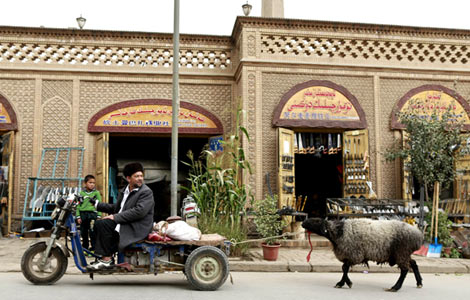Rumor-mongering suspect arrested in SW China
Updated: 2013-10-17 11:20
(Xinhua)
|
||||||||
KUNMING - A 51-year-old man has been arrested in Southwest China's Yunnan province in the country's crackdown on online rumor mongers.
Dong Rubin, who uses the online name "Bianmin", meaning "man living on the border," is suspected of falsely declaring the capital in company registration, illegal business operations and the crime of "creating disturbances," according to police authorities.
Dong had confessed to the police on the rumor-mongering procedures. He did these to gain economic profit, police said.
After being entrusted by "clients," he employed or arranged others to fabricate online posts and organized a team to comment. Then Dong himself, who is an online celebrity, commented and invited other famous bloggers to participate in the discussion to attract media attention until the clients' demands were met.
He is accused of starting rumors about four Huang family brothers in March 2011, defaming them as gang members, after he received 90,000 yuan ($14,656) from a businessman who was in conflict with the brothers in 2011.
To make the post eye-catching, the four brothers were called "Huang Silang," the name of a local bully in then Chinese blockbuster "Let Bullets Fly."
In January this year, Dong learned that a property company attributed poor sales of a real estate project in Xuanwei city to a thermal power plant nearby, and he told the company's owner that he could use rumors to force the power plant to shut down or relocate.
Dong and his team fabricated information that the plant had led to a large number of cancer cases in a village. They posted 39 such articles online and succeeded in making it a hot topic.
Dong's team got 100,000 yuan from the "cancer village" rumors, police said.
Dong also fabricated and spread rumors on the death of an airport official in Yunnan in May 2013, after being paid 80,000 yuan, police said.
In order to gain more popularity online, he allegedly posted fake information and comments that distorted facts during the investigation, prosecution and trial of the Mekong River attack, in which 13 sailors were murdered on Oct 5, 2011 by a Myanmar drug lord and his gang members.
Dong said there was not direct economic gains from the Mekong rumors, but he could win more attention from the public.
"I did not think much about the consequences of the untrue and wrong remarks," Dong told police at a detention center in Kunming city, the capital of Yunnan. "I sincerely apologize to the policemen whose reputations were damaged during the investigation of the (Mekong River) incident.
"I also want to say sorry to my fans and readers. I am ready to bear legal responsibilities."
Dong made a false report of 1 million yuan ($164,000) as registered capital to set up a company in 2011, by cheating the local industrial and commercial administration, police said.
Dong used to be a middle school teacher. He left the school after he was punished by the police for smuggling and gambling. He had been employed by a newspaper and later a website.
He came to fame in 2007 by posting sensational articles on popular websites and was listed by a newspaper as one of the ten most famous netizens in Yunnan province in 2008.
His arrest followed the punishment of several online rumor mongers including Qin Zhihui, who was found to have created and spread false information about a 2011 bullet train accident and China's most famous Good Samaritan, Lei Feng.
According to a judicial interpretation issued last month, people who post defamatory comments online in China will face up to three years in prison if their statements are widely reposted.
"Online celebrities and internet users should bear social responsibilities and conscience while making remarks," Dong said.
Most Viewed
Editor's Picks

|

|

|

|

|

|
Today's Top News
US debt impasse ending, Obama to sign bill
Facebook goes fishing in China
Michigan auto czar leading trade trip to China
Yuan gains the most in 20 years
Tibet avalanche claims 4
First interprovince subway route opens
US expert finds job 'rewarding'
Trending news across China
US Weekly

|

|














